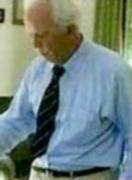|
|
||||||||||||||||||||||||
 |
Featured person
Recently added |
Sir Almroth Wright (1861 - 1947): |
||||||||||||||||||||||
Almroth Edward Wright was a leading authority in the study of bacteriology, immunology and haematology. He was also an enthusiastic advocate of full-time specialist research, and saw the importance of adequate funding for large-scale research projects in medicine. He is not well-known for one of the major discoveries to emerge from one of his laboratories, that of penicillin by Fleming. However, had it not been for Wright there would have been no laboratory in the first place.
Wright was born in Middleton Tynas Rectory near Richmond, Yorkshire, where his father was an Anglican clergyman; his mother was Swedish, daughter of Nils Almroth, Professor of Chemistry at the Karolinska Instituet in Stockholm; his uncle Perceval Wright, was Professor of Botany at the University of Dublin. Wright's father spent some years in Dresden and Boulogne, before his appointment as rector of St Mary's Church, Crumlin Road, Belfast in 1874. Wright spent his teenage years in Belfast, where he attended the Royal Belfast Academical Institution, along with all four of his brothers, of whom two, as well as Wright himself would later be knighted.
At seventeen he entered the University of Dublin where he studied modern languages and literature simultaneously with medicine, graduating BA in 1882 and qualifying in medicine in 1883. He was awarded a scholarship to study at Leipzig, at that time an outstanding world medical centre. After a period in London and Cambridge, he was back in Germany, at Magdeburg and Straßburg (now Strasbourg, France). In 1892 he was appointed Professor of Pathology at the Army Medical School at Netley, where he developed an anti-typhoid vaccine which was to save large numbers of lives, especially military. In 1902 he moved to St Mary's Hospital, Paddington, as an immunologist and pathologist. Here, he would research into phagocytosis (the process the human body uses to destroy dead or foreign cells), investigating the possibilities of stimulating immunity to combat disease. He also campaigned for a central funding agency for medical research, and 1913, the Medical Research Committee was established (now the Medical Research Council).
During the First World War, he was based in Boulogne, where faced with innumerable war wounds his studies of them led him to conclude that what was vital (literally) in their treatment was their immediate cleaning and excising. After the war, he returned to St Mary's, where he attracted some highly talented young researchers, the most celebrated of whom was Alexander Fleming, who in 1929 discovered penicillin. This antibiotic's success tended to render obsolete Wright's work on stimulating the natural immune system, though by the early 21st century, though his vaccine approach was being explored again, especially in elation to cancer treatment. Fleming eventually replaced Wright as Director of what was by then the Institute of Pathology and Research at St Mary's in 1946.
Wright's friendship with Irish playwright George Bernard Shaw led to his being characterised in Shaw's play The Doctor's Dilemma, the dilemma in question being a doctor's choice of having to pick whom to treat between an outstanding artist and an distinguished doctor. Wright is said to have disliked the play but he and Shaw remained friends. Wright retained his literary and linguistic interests throughout his life, even in his 80s learning Russian and even Inuit.
Wright has been described by a former Dean of Medicine at Queen's, Belfast, thus:
"Unquestionably Wright was one of the great medical/scientific intellects of his time, indeed of many times. As an immunologist and bacteriologist he stands with Pasteur and other Titans. He was knighted in 1906 the year he was elected a Fellow of the Royal Society who later struck a special medal for him since their coveted Gold Medal was considered inadequate. His work however led to one gigantic irony: Penicillin, discovered in his laboratory, opened up a new field in the treatment of infections thereby down-playing the potentials of active and passive immunisations which he, in the very same lab, had pioneered, and as a result for a long time their true potential remained neglected. Partly for this reason everyone knows of the conscientious Fleming; fewer know of the genius Wright."
Wright was made a Freeman of the City of Belfast in 1912 and received an honorary degree from Queen's University, Belfast, amongst many other honours. His funeral in London was conducted by Canon Lames Owen Hannay (the novelist George Birmingham), who was a boyhood friend from Belfast days.
| Born: | 1861 |
| Died: | 1947 |
| Richard Froggatt |
| Acknowledgements: Wesley McCann |
| Bibliography: Davis Coakley: Masters of Irish Medicine; Sir Peter Froggatt: “Inst and Medicine and Medicine at Inst” (public lecture, Belfast, 2010) |


Home | Our Policies | Plaques | Browse | Search | Sponsors | Links | Help | Contact
Privacy & Disclaimer | Cookie Policy | Site Map | Website Design By K-Point
© 2024 Ulster History Circle









